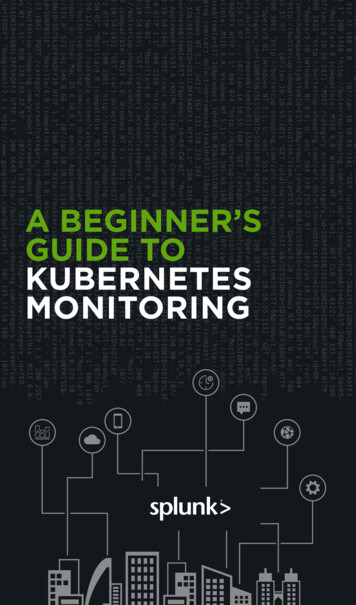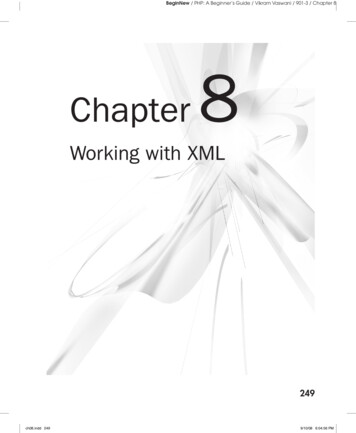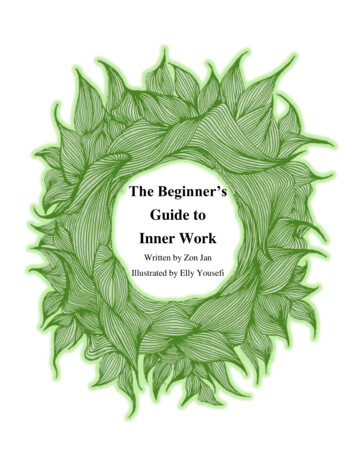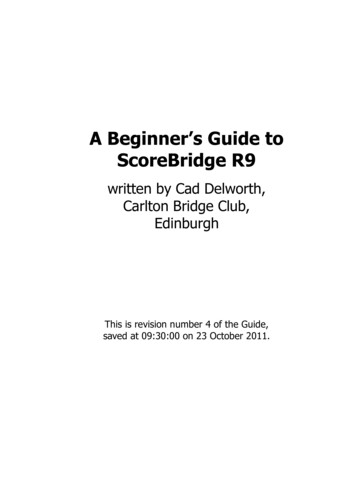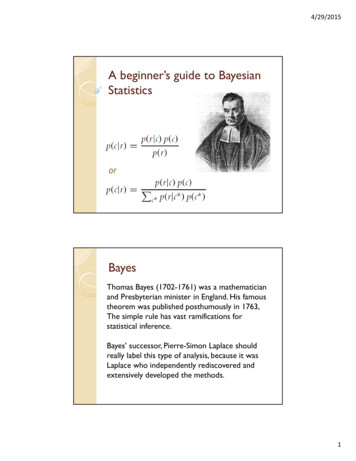
Transcription
4/29/2015A beginner’s guide to BayesianStatisticsorBayesThomas Bayes (1702-1761) was a mathematicianand Presbyterian minister in England. His famoustheorem was published posthumously in 1763,The simple rule has vast ramifications forstatistical inference.Bayes’ successor, Pierre-Simon Laplace shouldreally label this type of analysis, because it wasLaplace who independently rediscovered andextensively developed the methods.1
4/29/2015BayesThere is another branch of statistics, calledfrequentist, which does not use Bayes’ rulefor inference and decisions. This approach isoften identified Ronald Fisher (“F”-test).It is curious and re-assuring that theoverwhelmingly dominant Fisherian approach ofthe 20th century is giving wayin the 21st centuryto a Bayesian approach that had its genesis in the18th century.Bayesian Statistics – NY TimesSome statisticians and scientists areoptimistic that Bayesian methods can improvethe reliability of research by allowingscientists to crosscheck work done with themore traditional or “classical” approach,known as frequentist statistics. The twomethods approach the same problems fromdifferent angles.RA FisherRev.T. Bayes2
4/29/2015Bayesian Statistics – NY TimesThe essence of the frequentist technique isto apply probability to data. By contrast,Bayesian calculations go straight for theprobability of the hypothesis, factoring in anyother relevant information.Scientists who have learned Bayesian statisticsoften marvel that it propels them through adifferent kind of scientific reasoning than theyhad experienced using classical methods.Bayesian Statistics – NY TimesOne downside of Bayesian statistics is that itrequires prior information — and often scientistsneed to start with a guess or estimate.Assigning numbers to subjective judgments is “likefingernails on a chalkboard,” said physicist KyleCranmer, who helped develop a frequentisttechnique to identify the latest new subatomicparticle — the Higgs boson.3
4/29/2015Bayesian Statistics – NY TimesCritics of Bayesian Statististics say that the bestcure for misleading findings is not Bayesianstatistics, but good frequentist ones.A psychologist found common statisticalshenanigans in his field — logical leaps, unjustifiedconclusions, and various forms of unconsciouscheating. He looked into Bayesian statistics andconcluded that if people misused or misunderstoodone system, they would do just as badly with theother.A beginner’s guide to BayesianStatisticsor4
4/29/20155
4/29/20156
4/29/2015Conditional ProbabilityWhat is theprobability ofgetting sum 7,Given that thewhite die is one?1/36Prob (A and C) / Prob C 1/61/6p (r and c)p (c )p ( r and c)p (c ) p(r )p(r )Bayesian Probability ReasoningA model of data specifies the probability of particulardata values given the model’s structure and parametervalues.In other words, a model specifiesp(data values parameters values)along with the prior, p(parameters values)We use Bayes’ rule to convert that to what we reallywant to know, which is how strongly we shouldbelieve in the parameter values, given the data:p(parameters values data values)7
4/29/2015A beginner’s guide to BayesianStatisticsorSteps to Bayesian Analysis8
4/29/2015ExampleExample9
4/29/2015ExampleExample10
4/29/2015A beginner’s guide to BayesianStatisticsorBayes – Pro (Ellison 1996)In our statistical practice, we ecologists workcomfortably within the frequentist statisticalmethodology of Fisher. Consequently, our nullhypotheses do not utilize pre-existing data,experiments demand large sample sizes, and werarely use results from one experiment to predictthe outcomes of future experiments."Bayesian ecology" would (a) make better use ofpre-existing data; (b) allow stronger conclusions tobe drawn from large-scale experiments with fewreplicates; and (c) be more relevant toenvironmental decision-making.11
4/29/2015Bayes – Con (Dennis 1996)Bayesian statistics involve substantial changes inthe methods and philosophy of science. Beforeadopting Bayesian approaches, ecologists shouldconsider carefully whether or not scientificunderstanding will be enhanced.Frequentist statistical methods, while imperfect,have made an unquestioned contribution toscientific progress and are a workhorse of day-today research. Bayesian statistics, by contrast, have alargely untested track record.Final Thoughts12
Statistics or Bayes Thomas Bayes (1702-1761) was a mathematician and Presbyterian minister in England. His famous theorem was published posthumously in 1763, The simple rule has vast ramifications for statistical

